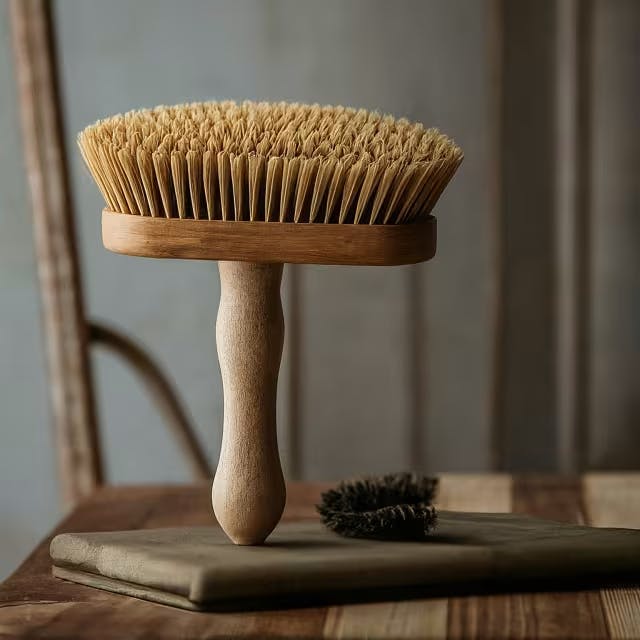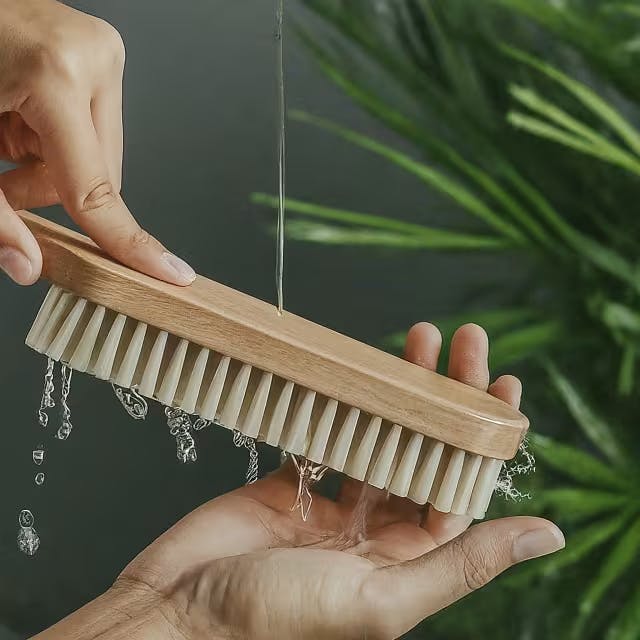Quality Hand Brushes for Metal Cleaning and Preparation
Abana Chapter
February 17, 2024

Ensuring the cleanliness and proper preparation of metal surfaces is not just critical in food-processing and handling operations, but in a wide range of industries where precision and safety are paramount. This article delves into the significance of using quality hand brushes for metal cleaning and preparation, a step that cannot be overlooked for anyone aiming to achieve optimal results in their metalwork projects. By choosing the right hand brush and employing effective techniques, you can ensure that metal surfaces are impeccably clean and ready for any subsequent processes, thereby enhancing the performance and longevity of your equipment.
Key Takeaways
Proper metal cleaning and preparation are vital across industries for precision, safety, and ensuring the longevity of equipment.
Choosing the right hand brush for metalwork is crucial for achieving immaculate cleaning and preparation results.
Quality hand brushes significantly contribute to the enhancement of metal surfaces, preparing them for further processing and improving the overall performance of the final products.
Effective techniques in using hand brushes can greatly influence the cleanliness level and readiness of metal surfaces for subsequent processes.
Regular maintenance and proper care of hand brushes ensure their longevity and sustained performance, aiding consistently in achieving desired outcomes in metal preparation.
The Importance of Proper Metal Cleaning
Effective metal cleaning and surface preparation are crucial steps before applying any finishes or treatments. The right tools can significantly impact the quality and longevity of the metalwork. Quality hand brushes, tailored for metal cleaning and preparation, play a pivotal role in achieving a pristine surface, free from contaminants that could compromise the finished product's integrity.
Selecting the appropriate brush involves understanding the type of metal, the nature of the contaminant, and the desired finish. For intricate or delicate tasks, softer brushes ensure gentle yet thorough cleaning, whereas tougher jobs might require more abrasive options. An optimal choice not only enhances the effectiveness of cleaning but also extends the lifespan of both the surface and the brush.
Key considerations include the bristle material (steel, brass, or nylon), the brush's size, and its ergonomic design for comfortable usage. Each factor contributes to an efficient and effective cleaning process, which is fundamental to subsequent metal finishing operations.
For further insights on achieving quality finishes on metal surfaces, explore metal finishing essentials, which outline various techniques and their role in maintaining quality and compliance through the finishing process.
Behind every polished final product lies meticulous preparation. A commitment to using quality hand brushes for metal cleaning and preparation ensures a solid foundation for any finishing work that follows.
Choosing the Right Hand Brush for Your Metalwork
Choosing the perfect hand brush for cleaning and preparing metal is critical to achieving a high-quality finish in your metalwork. With so many options out there, it's important to know the different types of brushes and what they're best suited for. Here's a helpful guide to steer you in the right direction:
Wire Brushes: Ideal for stripping away rust and peeling paint. You can find them in stainless steel, brass, and carbon steel varieties. If you need a brush that can handle tough jobs and last a long time, go for stainless steel. On the other hand, brass brushes are softer, perfect for gently cleaning sensitive metal surfaces without leaving scratches.
Nylon Brushes: These brushes are your go-to for lighter cleaning tasks. They're soft enough to clean surfaces gently, making them great for any work that requires a fines finish, ensuring the metal surface remains intact.
Tampico Brushes: Crafted from natural fibers, these brushes are not only environmentally friendly but also offer a middle ground in terms of scrubbing ability. They work well for both dry and wet brushing on different types of metal, providing a blend of muscle and mildness.
The project you're working on will dictate the kind of brush you need. For example, getting a surface ready for welding may call for a stainless steel wire brush to tackle heavy rust, whereas a delicate piece might be better served with a soft nylon brush.
For professionals in blacksmithing or metalworking, having the right tools is essential for both safety and effectiveness. Additionally, being knowledgeable about the key tools for metalworking can greatly improve the quality of your projects. If you're looking to understand more about blacksmithing tongs, which are vital for safely handling hot metals, this comprehensive guide is worth a read: Professional Blacksmith Tongs Types and Uses.
But choosing the right hand brush isn't just about the type of bristle. It's also important to consider the brush's size, handle design, and ergonomics. A wisely selected brush not only yields better outcomes but also makes the work process more comfortable and efficient.
The Benefits of Quality Hand Brushes in Metal Preparation
Choosing the right hand brushes for metal cleaning and preparation can significantly impact the final outcome of your metalworking project. These quality tools are not just about scrubbing away dirt; they play a critical role in ensuring surfaces are perfectly prepped for subsequent processes, such as painting, coating, or welding.
Enhanced Surface Quality: Fine, uniform bristles in these brushes reach into crevices to remove rust, scale, and contamination, leaving behind a smooth surface that's ideal for further treatment.
Versatility: Whether working with delicate surfaces that require a soft touch or tough rust that needs a bit more grit, there's a hand brush suited for every type of metal and application.
For those diving deeper into the world of metalworking, it's worthwhile to explore more specialized equipment. Advanced tools like CNC machines and laser cutters bring unparalleled precision to metal preparation, as highlighted in Advanced Metalworking Tools & Equipment.
Incorporating the right abrasives is also crucial for achieving the desired finish. For detailed guidance on selecting abrasives for metal finishing, including belt sanders, flap discs, and cut-off wheels, visiting Belt Sanders and Abrasives for Metal Finishing can offer valuable insights.
Quality hand brushes are an indispensable part of the toolkit for anyone working with metal, pairing traditional techniques with modern metalworking practices for the best results.

How to Effectively Use Hand Brushes for Metal Cleaning
For optimal results in metal cleaning, using the right technique with your hand brush is just as vital as the brush selection itself. Start with a dry brush to remove loose particles on the surface. Employ a gentle, yet firm, back-and-forth motion to ensure thorough coverage without scratching the metal. For tougher grime, slightly dampen the brush or use a compatible cleaning agent to help lift the dirt. Always align the brushing direction with the grain of the metal to maintain its integrity and appearance.
After cleaning, inspect the metal closely. If you find areas that require more detailed work, consider incorporating other tools such as handheld punches and chisels for precise cleaning around intricate areas or to remove more stubborn residues. This approach not only enhances the cleaning results but also prepares the surface impeccably for any subsequent treatment or finishing.
Remember, the goal is to achieve a clean, smooth surface without altering the metal's properties or appearance. Adjust your pressure and technique based on the metal type and the level of soiling. Proper care and maintenance of your brushes will extend their life and effectiveness, assuring you're always ready for the next cleaning task.
Maintaining Your Hand Brushes for Longevity and Performance
Keeping your hand brushes in prime condition is key to ensuring they last longer and work effectively. Here are some easy tips for maintaining your brushes and keeping them in great shape:
Clean After Use: It’s important to clean out any debris or metal particles from the bristles after each use. If you encounter any stubborn particles, a light tap of the brush against a hard surface, or using a specially designed comb for cleaning brushes, can help.
Proper Storage: Make sure to store your brushes in a place that’s dry and clean. Exposure to moisture can lead to rust in metal-bristled brushes and can degrade synthetic ones. Ideally, brushes should be hung up or stored in such a way that their bristles aren’t being bent or stressed.
Check for Wear: Regularly take a moment to check your brushes for any signs of wear and tear. Bristles that are bent, missing, or have worn down can hamper the effectiveness of your brush, and it might be time for a replacement.
Avoid Chemical Damage: Bear in mind that not all brushes are built to withstand harsh chemicals. Using the wrong kind of brush with certain cleaning solutions can damage the bristles, so always ensure you’re using the correct brush for the job.
For those who are delving deeper into metalwork, it's worthwhile to check out the recommended range of anvil accessories. This could provide valuable insights into enhancing your metal shaping work with the proper tools and equipment. In conclusion, investing in quality hand brushes for metal cleaning and preparation is pivotal for anyone looking to achieve optimal results in their metalwork projects. By focusing on selecting the right brush type, employing proper usage techniques, and maintaining the brushes well, one can significantly enhance the durability and performance of their brushes. These steps not only ensure a meticulously prepared metal surface but also guarantee longevity and efficiency in the preparation process.
Frequently Asked Questions
What are the types of quality hand brushes available for metal cleaning and preparation?
For effective metal cleaning and preparation, it is essential to select the right type of quality hand brush based on the metal and the task at hand:
Wire Brushes for removing rust and peeling paint, available in stainless steel, brass, and carbon steel.
Nylon Brushes, ideal for lighter, finer work to ensure a smooth finish without damaging the surface.
Tampico Brushes, made from natural fibers, offer a balance between strength and softness for various cleaning needs.
How do I select the right hand brush for my metalworking project?
Selecting the right hand brush for metalworking requires considering the metal type, contaminant nature, and desired finish. Choose brushes based on bristle material—steel for tough rust, brass for gentle cleaning, or nylon for delicate surfaces. Consider the brush size and ergonomic design to ensure efficiency and comfort during use.
What are the benefits of using quality hand brushes in metal surface preparation?
Using quality hand brushes for metal surface preparation offers significant benefits, such as improved surface quality, by thoroughly removing rust, scale, and contamination, thereby ensuring a cleaner, smoother surface for further finishing. They offer versatility, with a variety of bristle types designed to address different cleaning needs, whether for delicate tasks or more abrasive applications. Moreover, these brushes contribute to the longevity and effectiveness of the cleaning process, making them indispensable in achieving optimal results in metal finishing.
How should I properly use a hand brush for optimal metal cleaning results?
For optimal results in metal cleaning, start with a dry brush to remove loose particles. Use a gentle, firm back-and-forth motion, ensuring thorough coverage without scratching the metal. For tougher grime, slightly dampen the brush or use a compatible cleaning agent. Align the brushing direction with the grain of the metal to maintain integrity and appearance. Properly maintaining your brushes—cleaning after use, storing them dry, regularly checking for wear, and avoiding chemical damage—extends their life and effectiveness, ensuring you're always ready for the next task.
What are the best practices for maintaining and extending the life of my hand brushes?
To maintain and extend the life of your hand brushes, clean them thoroughly after each use to remove debris or metal particles. Store brushes in a dry, clean place to prevent rust or degradation and hang them to avoid bending the bristles. Regularly inspect for wear and replace if bristles are bent, missing, or worn down. Be cautious of chemical damage; ensure compatibility of brushes with cleaning solutions to prevent bristle damage.


